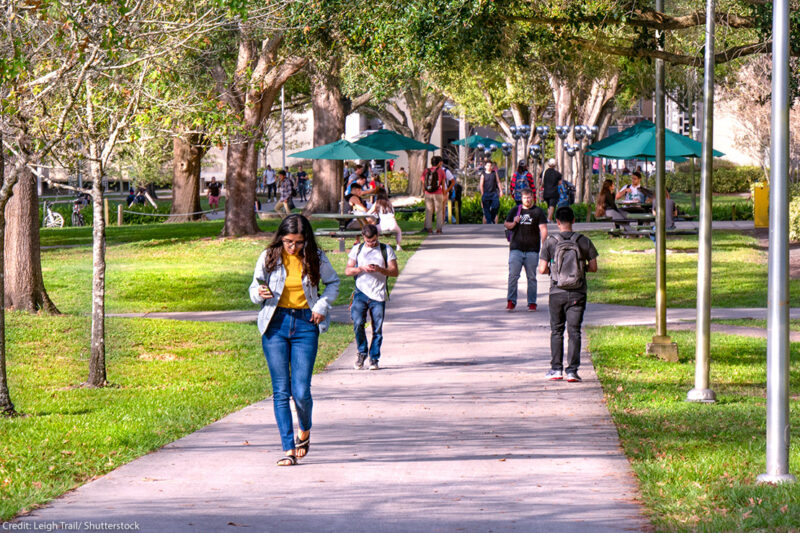The Importance of Defending the Free Speech Rights of Pro-Palestinian Students in Florida


Like everyone else, college students have a First Amendment right to express their political opinions and advocate for the causes they believe in. Universities have long served as hotbeds for students to exercise these rights, providing opportunities for them to encounter diverse perspectives and broaden their understanding of themselves and the world.
Recent actions by Florida officials violate the First Amendment and pose a threat to these freedoms. In October 2023, Florida State University System Chancellor Ray Rodrigues, together with Gov. Ron DeSantis, ordered public universities in Florida to deactivate their Students for Justice in Palestine (SJP) chapters. There are more than 200 SJP chapters in the country, and Florida has two. In the order, Chancellor Rodrigues makes unsubstantiated claims that Florida’s SJP chapters have violated the state’s material support for terrorism law. This dangerous and stigmatizing allegation is solely based on constitutionally protected statements published by the National Students for Justice in Palestine, a separate organization with no formal relationship to the Florida SJP chapters.
In response to Florida officials’ attempt to punish these students for something the national group said, the ACLU, the ACLU of Florida, and Palestine Legal filed a lawsuit on behalf of the University of Florida (UF) chapter of SJP. The UF SJP is an independent student-advocacy organization dedicated to organizing and educating its community on the struggle for Palestinian freedom. As its mission statement says, it is “directed at incorporating a diverse membership of people from all faiths and nationalities who believe in the attainability of peace.”

Students for Justice in Palestine at the University of Florida v. Raymond Rodrigues
Source: American Civil Liberties Union
As the lawsuit makes clear, the chancellor’s deactivation order constitutes a clear violation of students’ First Amendment right to free speech and association. UF SJP’s case aims to stop these unconstitutional bans, and to protect students’ right to speak out on matters of urgent concern.
Here’s what you need to know about the case, including how it could impact the future of free speech on campuses throughout the country.
Why did Florida officials issue the deactivation order?
Our client UF SJP was not involved in drafting or circulating the National SJP toolkit, and it didn’t use the language suggested in the document. It opted instead to issue its own statement that “the killing of any life is always undignified and heartbreaking,” and stressed that “[v]iolence against all innocent life is unacceptable.” UF SJP concluded: “We hope that no more lives, Israeli or Palestinian, are lost. We pray for those who are suffering.” Later frustrated by what it saw as the University of Florida’s disregard for Palestinian civilian deaths in Gaza and failure to support Palestinian and Muslim students on campus, the group urged its university to “condemn all violence, antisemitism, Islamophobia, Palestinian erasure, and anti-Palestinian sentiment.”
Strikingly, the deactivation order does not assert, or even suggest, that UF SJP has violated any law or policy that might justify the chapter’s disbandment.
Essentially, Florida officials are attempting to censor and punish these students for the political advocacy of another group—and even though the other group’s speech is itself protected by the First Amendment.
Why is the deactivation order a violation of the student group’s First Amendment rights?
Students and faculty at public colleges and universities have a First Amendment right to express themselves, which includes the freedom to voice dissent against government policies, and to advocate for the movements and causes they believe in. Florida’s deactivation order blatantly violates this right.
The Supreme Court has repeatedly recognized students’ right to free speech, including in times of crisis. In a 1972 case, Healy v. James, for example, the Court affirmed that the First Amendment protects the right of student groups to associate and to speak out on matters of public concern, free from censorship by public university officials. As the Court said , “nowhere is free speech more important than in our leading institutions of higher learning.” And the Court held that a public college could not deny recognition to a local chapter (like UF SJP) because of its relationship with a national group—or based on the views of either group.
How does the deactivation order harm the Students for Justice in Palestine?
With the death toll in Gaza exponentially increasing by the day, UF SJP sees the need for advocacy on Palestinian human rights as urgent and continuing — yet the threat of deactivation still looms, limiting the student group's ability to organize itself and others in support of its advocacy mission.
Since the deactivation order was issued, UF SJP’s funding has been in limbo. The organization’s sole source of funding is from the university’s Student Government, which makes funding available only to registered student groups. Deactivation would mean losing this funding and the UF SJP would not be able to afford to invite speakers to campus, print promotional materials for events and recruitment, or even provide food at events.
On top of funding worries, the group is worried about recruitment, given its reliance on school-controlled communications services. Only registered student organizations can post information on GatorConnect, which is the University of Florida website that students access for information about student organizations and upcoming events.
Florida officials’ accusation that the student group is providing “material support for terrorism” leaves current and potential members fearful of the devastating consequences that this stigmatizing label could have on their lives and advocacy.
Why will this case set a precedent for how we think about free speech on campus?
Florida officials’ deactivation directive poses a direct threat to students’ ability to make their voices heard and speak out on the rapidly deteriorating situation in Palestine.
In times of heightened political tension and global crisis, it is crucial for university leaders to safeguard free speech, open debate, and peaceful dissent on campus. Yet we’re seeing a surge in efforts across the country to punish and silence pro-Palestinian students and professors voicing opposition to Israeli and/or U.S. government policies.
These efforts include—
- In December 2023, Rutgers University suspended its chapters of the Students for Justice in Palestine, saying the university had received complaints claiming that the group was disrupting campus life and making students and staff feel unsafe. The Rutgers’ SJP denied these allegations. The chapter has since been reinstated, but remains on probation until December 2024.
- In Indiana, a tenured professor of political science and Middle Eastern studies was barred from teaching until next fall after incorrectly filling out a room request form for an event organized by the Palestine Solidarity Committee.
- The University of Michigan recently canceled student elections on resolutions related to Palestine and Israel, restricted or shut down student email listservs on which students were discussing the international crisis, removed posters expressing support for Palestinians from graduate students’ office windows, and responded with aggressive policing and punitive discipline to a campus protest and sit-in.
What happens next?
We hope that the court will see Florida officials’ deactivation order for what it is: A blatant and harmful effort to censor pro-Palestinian speech on campus, in violation of the Constitution. Florida officials’ ban against a student group exercising free speech is both dangerous and wrong. Actions like these could pave the way for further censorship and discrimination within our schools and across the nation. We therefore urge university leaders to remember that they are stewards of democracy and the Constitution and free speech principles require them to protect the rights of everyone, not just those with whom they agree.
For more than 100 years, the ACLU has fought for free speech and association while opposing government censorship in all forms. We believe that students have the right to speak out, and we will always defend that right.
